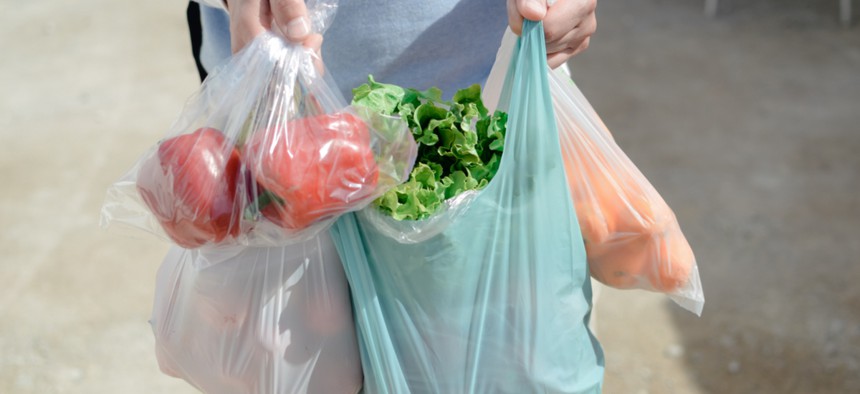Some States Stall Plastic Bag Bans During Coronavirus Outbreak

The policy changes follow the release of a study that found that coronavirus can live for days on some surfaces. Shutterstock

Connecting state and local government leaders
Lawmakers and some store chains are temporarily banning reusable bags amid fears that their usage could help spread coronavirus.
Some states and grocery stores have moved to temporarily ban reusable bags amid fears that their use could unintentionally contribute to the spread of coronavirus.
In Maine, lawmakers halted the implementation of a statewide ban on single-use plastic bags until 2021, while officials in New York said they would not begin enforcing a planned moratorium on plastic bags until at least May. New Hampshire Gov. Chris Sununu halted the use of reusable bags in his state via an emergency health order, which he said was necessary due to confirmed community transmission of the virus in New Hampshire.
“It is important that shoppers keep their reusable bags at home given the potential risk to baggers, grocers and customers,” Sununu said in a statement. “This emergency order directs all grocers and retail stores in the state to temporarily transition to only use new paper or plastic grocery bags provided by stores as soon as feasibly possible.”
In Massachusetts, Gov. Charlie Baker banned reusable bags and lifted local bans on disposable bags, saying that stores and pharmacies would no longer be allowed to charge fees for paper or plastic bags at checkout lines. Connecticut Gov. Ned Lamont said he would lift his state’s plastic-bag tax, but was not considering a ban on reusable bags.
Across the country, stores have taken similar actions. Hy-Vee, a Midwestern supermarket chain, said it would ban reusable bags in its stores “until further notice.” Meijer, a Michigan-based superstore, asked customers to temporarily refrain from bringing reusable bags into stores, while Target announced that it would continue to allow customers to use their own bags but would require those who do to bag their own orders.
The policy shifts come after the release of a study that found that Covid-19 can survive for up to three days on various surfaces if left undisturbed. But the virus can be easily destroyed with soap and water, meaning regular washing of reusable cloth bags should be enough to eliminate the risk.
The widespread bans, then, seem less about the science of virus transmission and more about the comfort of extra precautions, said Brian Castrucci, president and CEO of the public health-focused de Beaumont Foundation.
“The science is dubious, but people are afraid,” he said. “This is really about action, and wanting to do something to bring some level of control and normalcy back to your world. I don’t think it hurts anybody, and I think that should be our measure right now. If it doesn’t hurt anybody, and it makes you feel better, then don’t use those bags."
OTHER STORIES on Route Fifty:

NEXT STORY: Nearly 200 Cities Short on Supplies for Dealing With Coronavirus, Mayors Report




